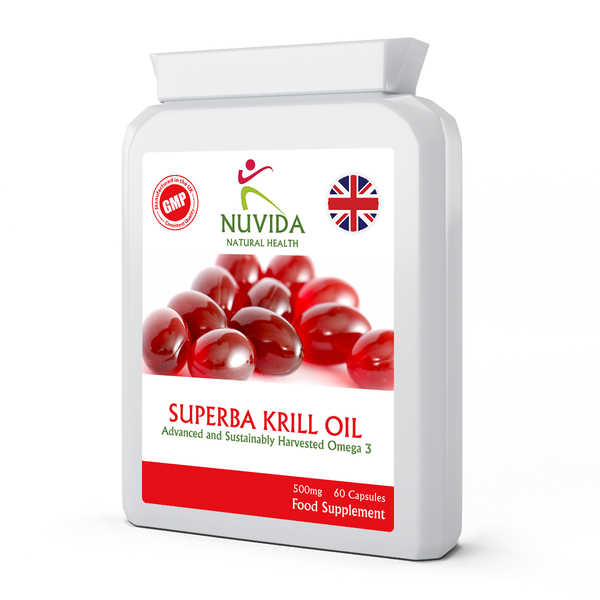Health News

10 Most Incredible Benefits Of Krill Oil And Omega-3 Fatty Acids
Sunday 5th February 2023
Courtesy of Eddie Jones
The Joys Of Omega -3
To say that omega-3 fatty acids, found in fish and krill oil, are genuine natural wonders would be somewhat of an understatement. An abundance of research over several decades has illustrated time and time again that as far as fats go, omega-3 fatty acids are among the best — if not the very best.
The importance of docosahexaenoic acid (DHA) and eicosapentaenoic acid (EPA), in particular, is well-documented. Both pack a seriously beneficial punch for human health throughout life. From the prevention of heart disease to LDL cholesterol reduction and so much more, omega-3 is like a dose of pure gold for human health and well-being.
But as the human body cannot produce omega-3 on its own, it is crucial to ensure it is taken in both through dietary choices and daily supplements. Every day, tens of millions of us take various fish oil supplements in order to increase omega-3 intake, but up to 90 percent of what’s ingested is lost due to poor absorption.
This is precisely why health and scientific communities alike are so encouraged by krill oil, which is already proving to be one of the most important discoveries since omega-3 itself was first identified.
What Is Krill Oil And What Can It For You?
As the name quite rightly suggests, krill oil is extracted from tiny sea creatures of the same name and to our benefit they contain a rich dose of omega-3. But what’s truly extraordinary about krill oil is the way in which it takes all the benefits of standard fish oil and ups the ante considerably with a series of unique properties.
So in accordance with what research today has taught us, here’s a quick overview of the 10 biggest benefits of krill oil when used as a nutritional supplement:
1. Bioavailability
First up, the composition of krill oil is somewhat different to that of fish oil. Omega-3 fatty acids in krill oil attach to phospholipids as opposed to triglycerides, which in simple terms makes the omega-3 easier to absorb. As such, a lower dose of krill oil is required to gain the same benefit as a higher dose of standard fish oil.
2. Improved Cardiovascular Health
The omega-3 found in krill oil has long been associated with improvement to cardiovascular health, including the lowering of LDL (bad) cholesterol levels, the reducing of triglyceride levels and increasing HDL (good) cholesterol levels. The anticoagulant effect of omega-3 is also beneficial in preventing blood clots which can cause strokes and heart attacks.
3. Taste Tolerance
Fish oils are often notorious for presenting a rather unfortunate aftertaste which can perpetuate somewhat tenaciously. By contrast, the much smaller gel tablets krill oil is supplied in are both easy to swallow and present little to no aftertaste whatsoever.
4. Anti-Inflammatory
Extensive studies have shown how effective krill oil can be in the reduction and prevention of inflammation. Scientists suggest that omega-3 is converted by the body up into eicosanoids – powerful hormones which are responsible for several important purposes within the body including the release of anti-inflammatory prostaglandins.
5. Stability
Krill oil contains astaxanthin – a powerful antioxidant that keeps the compound stable and prevents it from spoiling both in your stomach and in your cupboard. And of course, the benefits of antioxidants for the human body are equally well-documented.
6. Neurological Development in Infants
Pregnant mothers are often recommended by their family doctors to increase their omega-3 consumption in order to benefit the neurological development of their unborn infants. The brain, central nervous system, and eyes of both unborn and newly-delivered babies rely heavily on omega-3 fatty acids for strong development.
7. Purity
While many fish oils contain detectable levels of toxins like mercury, krill oil does not. This is due to the position of krill in the marine food chain as these tiny creatures feed only on phytoplankton which do not contain mercury. In fact, omega-3 sourced from krill is considered to be the purest on the planet.
8. PMS Symptom Reduction
The anti-inflammatory properties of omega-3 fatty acids have also been linked with a reduction in the unpleasant physical symptoms of PMS. Scientists are still not entirely sure exactly how and why omega-3 has such an effect on PMS symptoms, though it is theorized that the answer lies in the regulating and balancing of hormones.
9. Sustainability
Weighing in at an impressive 500 million tons, tiny krill amount to the world’s largest single biomass. Each year, less than one percent of the world’s total krill are taken and utilized for oil extraction and research purposes, resulting in a uniquely abundant and sustainable source of omega-3.
10. Better Digestion
Last up, several studies have linked both EPA and DHA with anti-depressive effects and mood and enhancement. This again is theorized to be the result of omega-3 leading to an increase in corticotropin-releasing hormone levels, which along with a boost in the dopamine and serotonin levels can have a marked effect on mood and perhaps even combat depression.
The above list is far from exhaustive and should be interpreted simply as an introduction to the incredible and seemingly-endless benefits of krill oil. Omega-3 remains the world’s most heavily-studied marine compound, with hundreds of thousands of studies having returned little other than extremely reassuring findings.

